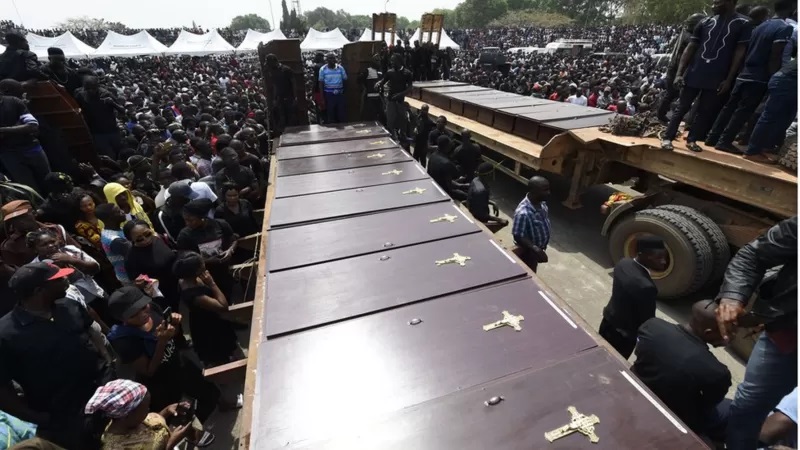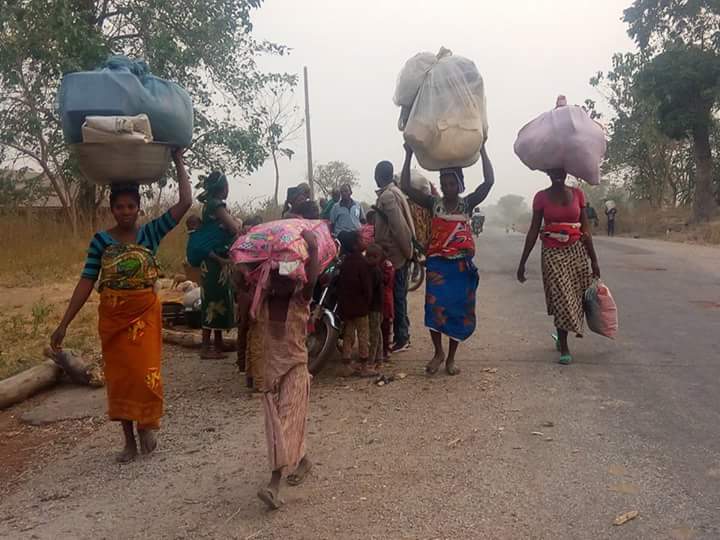By
Dr. Ola Olateju
The prevalence of mass deaths in Nigeria has increasingly made us a nation marked by untimely deaths resulting from communal conflicts, herdsmen attacks, terrorism, and mass kidnappings. Innocent remain reactive, ceremonial, and devoid of substantive policy measures.

In December 2023, coordinated attacks in Bokkos and Barkin Ladi Local Government Areas of Plateau State resulted in nearly 200 deaths and over 500 injuries during Christmas Eve massacres. These attacks, attributed to armed militias, were not isolated incidents but part of a recurring pattern of premeditated violence targeting farming communities in central Nigeria.
Similarly, terrorist groups such as Boko Haram and the Islamic State West Africa Province (ISWAP) have maintained a relentless campaign of violence. In January 2025, over 50 residents were killed in separate attacks on the Dumba community in Borno State and Tatara village in Nasarawa State.
In Borno, the attack targeted farmers and fishermen in Dumba, Kukawa Local Government Area, located on the fringes of Lake Chad. The state’s Commissioner for Information, Professor Usman Tar, reported that about 40 farmers were killed, with many others missing. In Nasarawa, 10 persons were killed in Tatara village by suspected Fulani militia who launched unprovoked attacks, shooting sporadically and causing significant casualties.
WEAPONIZED INACTION: WHEN REACTIONS REPLACE RESPONSIBILITY
Rather than implementing proactive measures or decisive actions, the Nigerian government continues to issue hollow press releases following mass atrocities. These statements, often delivered by presidential spokespeople or state governors, contain predictable expressions of “shock” and “condolences,” without any follow-up mechanisms for justice or prevention. The repetition of this ritualistic response signals a normalization of state inaction. According to Adebajo (2021), Nigeria’s persistent failure to punish mass murderers not only undermines justice but actively encourages further violence.
Without consequences, violence becomes a viable political and economic strategy. Political elites, complicit by silence or omission, have enabled a state of impunity that rewards killers and marginalizes victims. This pattern of “governing through reaction” substitutes actual governance with optics.
As Abubakar (2020) argues, media management has become a central feature of Nigeria’s crisis response architecture, replacing evidence-based policy and structural reform.
FROM PUBLIC TRAGEDY TO PRIVATE MOURNING: THE SILENCE OF THE STATE
The Nigerian public has become dangerously desensitized to mass killings. News of large-scale massacres barely dominates headlines for more than 48 hours. This reflects not just media fatigue, but a wider sociopolitical culture where human life has lost its moral weight in the national imagination. The terminology of “unknown gunmen” and “bandits” is deliberately vague, enabling the state to shirk responsibility and avoid accountability.
Odinkalu (2022) notes that such linguistic devices decontextualize violence, erase victims, and perpetuate narratives that absolve those in power. After every major tragedy, elected officials visit affected communities in choreographed condolence tours. These visits are more symbolic than functional and are rarely followed by real policy shifts or judicial proceedings.

As Femi Falana (2020) aptly describes it, this is “ritualistic governance,” where spectacle replaces substance and grief is politicized.
WHAT THE NUMBERS SAY: THE COST OF A BLOODIED FEDERATION
The scale of violence in Nigeria is staggering. According to the Armed Conflict Location & Event Data Project (ACLED), over 63,000 people have died in Nigeria due to organized violence between 2011 and 2023, including terrorism, inter-communal conflict, and banditry. These numbers outstrip the casualties of many civil wars, yet the national conversation remains muted and fragmented. In 2021 alone, more than 1,400 schoolchildren were kidnapped by criminal gangs and insurgents across northern Nigeria. The trauma inflicted on families and local communities remains largely unaddressed. Beyond loss of life, the economic, psychological, and societal impacts are devastating.
Entire villages have been emptied, agricultural productivity has plummeted, and millions of internally displaced persons live in makeshift camps with little access to basic services.
The state’s failure to respond effectively represents not only a humanitarian crisis but a national security catastrophe.
REGIONAL FOCUS: SOUTHWEST AND SOUTHEAST NIGERIA (2023–2025)
While the North has borne the brunt of insurgent attacks, the Southwest and Southeast regions have not been spared from escalating violence between 2023 and 2025.
Southeast Nigeria
The Southeast has witnessed a surge in separatist agitation, leading to violent confrontations and loss of lives. On May 30, 2024, armed men attacked a military checkpoint at Obikabia junction in Abia State, resulting in the deaths of five soldiers and six civilians. The Nigerian military attributed the attack to the outlawed Indigenous People of Biafra (IPOB), a separatist group seeking secession for the Igbo-majority region.
Additionally, in November 2024, simultaneous attacks in Abatete and Ukpo communities in Anambra State led to the deaths of three vigilante members and an innocent citizen. These incidents have instilled a pervasive atmosphere of fear in communities where local policing structures are weak or politicized. Residents now live under the constant threat of attacks with minimal protection from security forces, whose presence is often reactionary and temporary (International Crisis Group, 2024).
Southwest Nigeria
In the Southwest, violent incidents have taken on a multi-dimensional character, ranging from ritual killings to clashes between farmers and herders, and bandit incursions. In January 2023, over 20 people were killed in Ago-Oluwa, Oyo State, following a bloody clash between Fulani herdsmen and Yoruba farmers over land use disputes. Eyewitnesses recounted that armed herdsmen invaded the community in a predawn raid, burning homes and executing residents in their sleep (Premium Times, 2023).

In Ondo State, the June 5, 2022 massacre at St. Francis Catholic Church in Owo still casts a long shadow. At least 40 worshippers were killed in the attack, which was later blamed on ISWAP terrorists. Despite national outrage, few arrests were made, and the victims’ families continue to cry for justice (BBC News, 2022).
Similarly, in early 2024, Ekiti and Osun States recorded a string of kidnapping incidents on highways and rural roads. In March 2024, four university students were abducted along the Ilesa-Akure Expressway, and ransom demands stretched into tens of millions of naira. In all these cases, state response was limited to setting up “task forces” and issuing media warnings, with few tangible outcomes.
CONCLUSION: TOWARD A CULTURE OF MEANINGFUL MOURNING AND STATE RESPONSIBILITY
Nigeria stands at a precipice where the normalization of violence and death is eroding the very foundation of civic life. The state has not only abdicated its responsibility to protect lives but has, through negligence, emboldened a culture where death is routine and justice is optional. To reverse this dangerous trajectory, a national reckoning is urgently needed. First, the federal and state governments must adopt a zero-tolerance policy for mass atrocities, regardless of the perpetrators’ affiliations. This includes re-investing in intelligence-based policing, reforming the security sector, and ensuring swift, non-partisan prosecution of violent crimes.
Second, the culture of meaningless rebuttals and media sound bites must be replaced with concrete and transparent actions. National mourning must be institutionalized beyond a flag at half-mast—it must involve support for victims, public truth-telling, and the acknowledgment of state failures.
Third, the media, civil society, and faith communities must reclaim the moral high ground by giving voice to the voiceless, documenting every life lost, and insisting on institutional accountability. Finally, there must be a spiritual and civic shift in how we value human life.
We must refuse to accept “mass graves” as the background noise of national existence.
Until Nigeria re-centers the sanctity of life at the core of governance, every “Breaking News” headline of a new massacre will simply be a prelude to the next.
OLA OLATEJU WRITES FROM THE DEPARTMENT OF POLITICAL SCIENCE, ACHIEVERS UNIVERSITY, OWO, ONDO STATE


